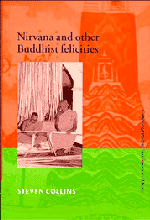Book contents
- Frontmatter
- Contents
- Preface and acknowledgments
- List of abbreviations
- Textual chronology
- General introduction: Buddhism and civilizational history 1 – structures and processes
- PART 1 NIRVANA IN AND OUT OF TIME
- PART 2 PARADISE IN HEAVEN AND ON EARTH
- Introduction to part 2: utopia and the ideal society
- 4 Heaven, the land of Cockaygne and Arcadia
- 5 Millennialism
- 6 The perfect moral commonwealth? Kingship and its discontents
- 7 The Vessantara Jātaka
- Conclusion to part 2: in what sense can one speak of Buddhist utopianism?
- General conclusion: Buddhism and civilizational history 2 – reprise
- Appendices (translated texts)
- Bibliography
- Glossary and index of Pali and Sanskrit words
- Name index
- Subject index
Conclusion to part 2: in what sense can one speak of Buddhist utopianism?
Published online by Cambridge University Press: 18 December 2009
- Frontmatter
- Contents
- Preface and acknowledgments
- List of abbreviations
- Textual chronology
- General introduction: Buddhism and civilizational history 1 – structures and processes
- PART 1 NIRVANA IN AND OUT OF TIME
- PART 2 PARADISE IN HEAVEN AND ON EARTH
- Introduction to part 2: utopia and the ideal society
- 4 Heaven, the land of Cockaygne and Arcadia
- 5 Millennialism
- 6 The perfect moral commonwealth? Kingship and its discontents
- 7 The Vessantara Jātaka
- Conclusion to part 2: in what sense can one speak of Buddhist utopianism?
- General conclusion: Buddhism and civilizational history 2 – reprise
- Appendices (translated texts)
- Bibliography
- Glossary and index of Pali and Sanskrit words
- Name index
- Subject index
Summary
IN WHAT SENSE CAN ONE SPEAK OF BUDDHIST UTOPIANISM?
The General Conclusion takes up again the overall sense, introduced in the General Introduction III.d, in which I am using the category of utopia – as eu-topia and ou-topia – in relation to the discourse of felicity in the Pali imaginaire. This conclusion to Part 2 addresses narrower issues concerning the typology of ideal societies taken from Davis (1981) to organize the Buddhist ideas and stories in Part 2. As stated in the Introduction to Part 2, I want these terms to sit lightly on the Buddhist materials: nothing essential to my description or analysis of Pali texts is dependent on these labels and definitions. The aim in using them has been to suggest one avenue for comparative understanding, and invite one kind of comparative reflection. Many others are possible. Even for these purposes, indeed, the typology is not obligatory: other scholars may for their own purposes want to criticize, subtract from and/or supplement Davis' terms. Krishan Kumar, for instance, in a useful textbook (1991: 3–19), differentiates utopia from other “varieties of the ideal society or the ideal condition of humanity”: the Golden Age, Arcadia, Paradise, the Land of Cockaygne, the Millennium and the Ideal City. The last has considerable resonance with the Buddhist imagery of nirvana as a city, as also with the city of heaven.
- Type
- Chapter
- Information
- Nirvana and Other Buddhist Felicities , pp. 555 - 562Publisher: Cambridge University PressPrint publication year: 1998



